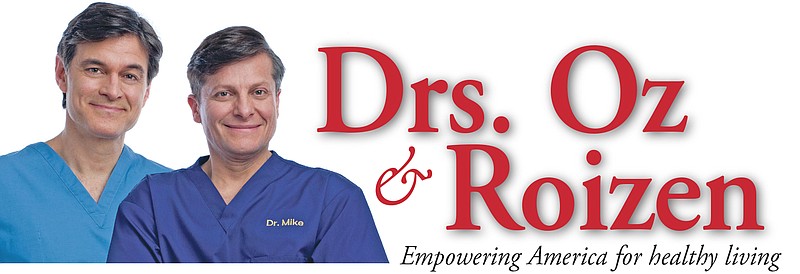Q: I get 10,000 steps a day four days a week, but it doesn't keep me from waking up stiff and sore. I'm 63 and need advice on getting more limber. - Marion S., Albany, New York
A: Waking up stiff is a sign of inflammation. To ease that, sleep on your back with a pillow under your knees or on your side (not in fetal position) with a pillow between your knees. Also, adopt an anti-inflammatory diet - eat a rainbow of colorful produce, and skip dairy, red meat and processed meats and refined grains - and practice stress management daily.
As for your muscles, tendons and ligaments as you age, even if you're active, shifts in hormone levels, immune system function, circulation and skeletal muscles' protein metabolism cause muscles and connective tissue to lose tone and strength, and joint lining to produce less lubricating synovial fluid. So, to loosen up, try these two stretches.
1. Stand with feet a shoulders' width apart; extend arms overhead, hands clasped together. Now bend slowly left - stretching the right side of your torso. Hold for 10-30 seconds. Repeat on the other side. Do that three times.
2. Stretch your hamstring by elevating your right heel on a stool or curb with your leg straight, toes pointing upward. Hinge forward from your hips with a straight back until you feel the stretch. Hold for 30 seconds. Switch sides; repeat three times.
But it takes more than morning stretches to stay flexible as you age.
Hydration. Start the day with 12 ounces of water; you want to get 64 ounces daily. It helps with joint mobility and pumping blood to the muscles. If you're active - and sweating - you need even more.
Exercise. By compressing muscles, you help bathe connective tissue and joints in fluids needed to stay supple. So after stretching, do aerobics five days a week and strength training two days a week.
Supplements. Omega-3s, CoQ-10 and vitamin D help build muscle strength; collagen can help reduce water loss in tissue. Ask your doc about taking them.
Q: Last week I was at my gynecologist and she started asking me about my blood pressure and cholesterol. I like a careful doctor, but really what does that have to do with reproductive health?
A: Good doc! Elevated lousy cholesterol impacts fertility by increasing plaque in the blood vessels, limiting blood flow. Research shows that if either one or both partners have high LDL cholesterol it takes much longer to become pregnant than it does for couples whose cholesterol levels are in a "normal" range.
High blood pressure also increases your risk for stroke, and if you're pregnant and your BP is unchecked, it can lead to everything from premature birth to a detached placenta. Some research indicates that high blood pressure can even contribute to the development or worsening of fibroids.
If elevated blood pressure and lousy LDL cholesterol are accompanied with obesity, you need to talk to your doctor about a whole menu of reproductive and pregnancy-related diseases that you are at risk for, as well as lifelong problems that your health issues can cause for your offspring.
But don't think you're alone: A study in the Journal of Women's Health found that 86% of women seen at 16 gynecology clinics across the country had a cardiovascular risk factor and 40% had at least one cardiovascular symptom, such as angina - but a third of those women didn't know their cholesterol levels and 18% didn't know if they had diabetes or not!
Since for many women, their gynecologist functions as their primary care doctor, it's vital that cardiovascular health be addressed at each visit. If your gynecologist doesn't check on your heart health, bring it up by asking if you have any cardiovascular factors that might affect you overall, or your genital health and reproduction. And if you haven't had a cholesterol screening in the past year or two, or your blood pressure hasn't been recently checked, ask for those tests to be done.
Mehmet Oz, M.D. is host of "The Dr. Oz Show," and Mike Roizen, M.D. is Chief Wellness Officer and Chair of Wellness Institute at Cleveland Clinic. Email your health and wellness questions to Dr. Oz and Dr. Roizen at [email protected].
(c)2020 Michael Roizen, M.D.,
and Mehmet Oz, M.D.

